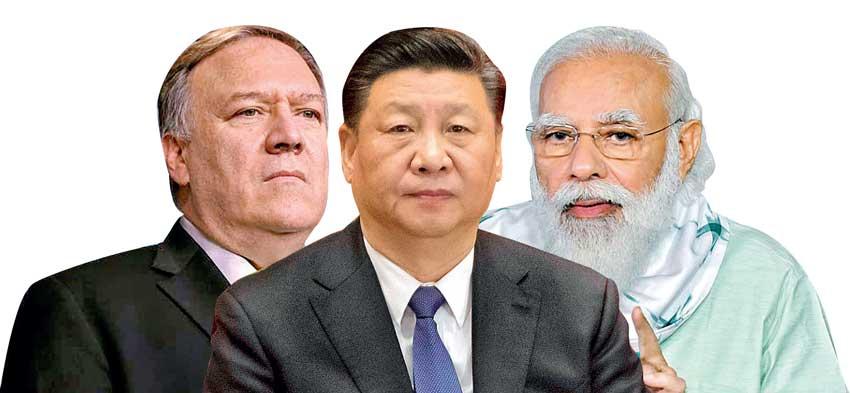29 Oct 2020 - {{hitsCtrl.values.hits}}

 Secretary, Ministry of Foreign Affairs, Admiral (Rtd.) Jayanath Colombage, said quite a mouthful when he said Sri Lanka has an ‘India First’ foreign policy. He didn’t say, for example, ‘first India, others later.’ He later said ‘Sri Lanka first.’ Maybe he could have explained it all this way: ‘Of course Sri Lanka comes first, it goes without saying.’ On the other hand, abject servility to other countries by governments and political leaders over the years compels one to question such claims.
Secretary, Ministry of Foreign Affairs, Admiral (Rtd.) Jayanath Colombage, said quite a mouthful when he said Sri Lanka has an ‘India First’ foreign policy. He didn’t say, for example, ‘first India, others later.’ He later said ‘Sri Lanka first.’ Maybe he could have explained it all this way: ‘Of course Sri Lanka comes first, it goes without saying.’ On the other hand, abject servility to other countries by governments and political leaders over the years compels one to question such claims.
No act of treachery is ever acknowledged; it is always ‘in the best interests of the nation.’ It’s been about ‘the best we can do under the circumstances.’ ‘This is only temporary,’ we’ve been told. It’s seldom any of that, though.
What is ‘Sri Lanka first,’ then?

For there to be a national interest, in the first place, there has to be some understanding of ‘nation,’ and for this history, heritage, culture, the general will of the population etc. must be ascertained. The problem is that such things can be defined in multiple ways. What makes matters more complex is that each and every definition can be defended with seemingly cogent arguments. ‘Seemingly,’ because cogency can be easily obtained through selective consideration of things and arbitrary weightage to the considered factors.
If there are imponderables or things hard to ponder, then there have to be that which is indeed ‘ponderable.’
So let us ponder. Let us ponder about external relations, global realities and local imperatives. The talk is of the USA (given Secretary of State Mike Pompeo’s visit). There’s talk of India (when has India ever been out of the equation!). There’s talk of China because of the Chinese footprint, so-called, and because India and the USA (along with Japan and Australia) are clubbing together to counter that country.
India. There was a time (late eighties) when Indophiles posing off as nationalists working for the national interest (yes, they come in all sizes, shapes, hues and big-words) who talked of ‘the geopolitical reality that is India’ in order to justify Indian meddling in Sri Lanka. In the end Sri Lanka had to deliver India’s side of the bargain (disarming the terrorists). India went from bragging about the Bhutalization of Sri Lanka (Rajiv Gandhi’s words) and consequently the regional bully that went out of her way to ensure Sri Lanka stayed plunged in a deadly battle with terrorism to a decent enough friend who, with some technological and intelligence assistance, supported the effort to defeat the LTTE. Pakistan was the greater and more consistent friend; this needs to be acknowledged.
Narendra Modi seems to be a different kind of Indian Prime Minister when it comes to relations with neighbours. On the other hand, Modi is so cosy with Uncle Sam that his assurances have to be considered dodgy, not least of all because Pompeo himself confessed that lying, cheating and theft are all part of the US story when it comes to international relations.
India hasn’t been an unto-death kind of friend, internationally. At best India has moved to dilute resolutions brought either by the USA or her proxies against Sri Lanka. Not an all-weather friend, not a sworn enemy either.
China. Now that’s a country with which there’s a long history. For all the loud noises about historical relationships and long-standing friendships, when Sri Lanka was struggling to rise from the morass of an unnecessary war facilitated if not orchestrated by India, it was neither India nor the USA that offered help. It was China.
Did I hear someone whine, ‘But China has a history of opaque agreements and there’s a Chinese debt-trap!’? The original and most pernicious debt-trap was manufactured under orders from and the supervision of the USA. That’s how we got the IMF and World Bank, remember? As for the opaque, what’s more dense than the claims about non-existent weapons of mass destruction, the search for which ‘compelled’ the USA and her allies to bomb Iraq into the Middle Ages?
Does any of this justify capitulation to China? Of course not, but let’s keep some perspective here. China is a reality. India is a reality. The USA is in decline (and that’s NOT thanks to Donald Trump — we’ve heard that lame excuse!) but is still an armed-to-the-teeth arm-twister.
It’s all about pounds of flesh. Well, it’s not pound-for-pound exactly, the terms of exchange/dependency are usually titled heavily in favor of the supposed Good Samaritan. That has been the story for decades: the political economy of ‘assistance.’
It would be foolish to believe that any of these countries truly want to help Sri Lanka. China loves China, India loves India, the USA loves the USA and all these countries want Sri Lanka to love them. It’s like saying ‘It’s not that I love Sri Lanka less, but I love India more (or the USA or China as the case may be). Actually, such things are not said. Neither are they implied. They are apparent in the outcomes.
Would any of these countries want Sri Lanka to be truly independent, or let’s say ‘less dependent’? They talk of trade and that’s not necessarily a bad thing. They don’t talk about setting up our own factories, developing our own manufacturing operations, moving away from an industrialisation that’s nothing more than glorified assembly. They talk of loans and less about investments; they do not recommend that Sri Lanka strengthen herself by creating development banks (they, instead, want Sri Lanka to privatise the state banks). The USA, for example, will toss free market theories that are an affront to intellect and are not borne by history, but will not tell us the following: China’s surge has a lot to do with communes, Japan’s rise had a lot to do with common property and as for the so-called Asian Tigers, the state played and still plays a crucial role.
If it is Sri Lanka First, then domestically it has to be about true domestic industrialisation first, food security first and constitutional amendment that is with, by and for Sri Lankans first and last.
In terms of relations with the big names in the international community here are some key areas: Indian Ocean as a Peace Zone (first proposed by Sri Lanka), doing nothing to jeopardise India’s security concerns, investments as opposed to loans/grants, no-thanks to all offers by countries struggling to become democracies (like the USA) and countries who need wars like they need to breathe (like the USA) to help Sri Lanka become a better functioning democracy. Sri Lanka First. Nice idea. First and last, it has to be grounded. For that, we need the land to be ours.
In every sense of the word. Now that’s something Admiral (Rtd.) Jayanath Colombage can work on.
[email protected]
www.malindawords.blogspot.com
30 Nov 2024 7 minute ago
30 Nov 2024 2 hours ago
30 Nov 2024 5 hours ago
30 Nov 2024 6 hours ago
30 Nov 2024 9 hours ago